Stories For Christians 2: Tossing Meat To Churchian Dragons
 Let’s admit it: after a while, all the complaining by Christian fantasy/sci-fi/other fans can seem a little old. I do much of that complaining myself. If you are reading, you likely do too.
Let’s admit it: after a while, all the complaining by Christian fantasy/sci-fi/other fans can seem a little old. I do much of that complaining myself. If you are reading, you likely do too.
Besides, we keep finding exceptions, do we not? Thus our hearty disclaimer goes like this:
Look at the continued success of C.S. Lewis. And even in the more-popular level, SF authors like Frank Peretti, Ted Dekker, and even the Left Behind series guys have made enormous inroads. Sure, some of the writing may not be that great, but still, this proves there is a market. All we need to do is a) publish more books, b) get behind the greatest authors, c) make the fiction more Edgy and/or less Preachy, d) publish my great novel, of course!
So the genres are actually selling somewhere. Great. No, it really is great. But I still ask: what are people using the product for? If all those books are merely serving as doorstops or to prop up wobbly table legs, it’s all for naught. And no, I don’t think it’s that bad. However:
If Christian SF advocates say: Great, at least some people want these visionary stories …
While maybe most readers instead think according to their Churchian Dragon-ish rules for what stories they will allow or maybe even enjoy: Pfshh, the kids sure like this “fantasy” stuff for some reason, and I can’t let them read Harry Potter, so I am certainly glad there’s a Christian Equivalent that I can toss at them and from which they can Learn Values …
… Is Christian SF really stealing past those Dragons, or tossing them red meat?
Though we should still push for more truthful, more beautiful, and more fantastic novels, maybe we also need to look at how many readers are using these books. But also, what about those exceptions to the Dragons’ rules? How did they seem to steal past the Dragons?
Successful steals(?)
My suggestion — against which I encourage challenge and discussion — is that the Christian SF authors allowed past the Dragons always won trust with readers in “nonfiction” areas.
I’m not saying this is right or wrong. And already I can hear the rightful insistence rise that Christians should want to experience truth and beauty with Story itself as an intrinsically good Thing, not just as a means to some other “practical” end! I hear that protest, I join in, and I give a fist-pump. Yet I contend those Dragons will, with very good intentions, blast fire on anything that doesn’t look useful according to their own “nonfiction”-based expectations. And thus far, these have only allowed authors who seem to address “Practical” Concerns. They may even contradict the author’s expressed intent of why he wrote, such as with …
1. C.S. Lewis
Lewis naturally won many Christian readers’ trust with his unabashed yet winsome defense of orthodox faith in Mere Christianity and many other nonfiction works. Yet with his fiction, especially The Chronicles of Narnia, even many Christians who don’t mind the mythological creatures and magic will allow the series — for bad reasons. They may bypass Lewis’s own insistence that he didn’t set out to write only Biblical allegory or only fairy tales for children (though these were among his goals) and thus break into his work and salvage it for more “practical” parts. We need good stories for our kids that aren’t secular. And they must have a Pure Salvation Allegory™, because I assume that’s the only healthy fantasy that exists.
Alas, even Christians who know Biblical hermeneutics violations — that we do not salvage Scripture for our own foreign intents, taking phrases/verses/books out of context and far beyond the Author’s and authors’ original meaning — will throw all those principles right out the window when it comes to fiction. The author’s intent? Does it matter? I’ll use it my way.
2. Frank Peretti
I caught the end of the 1980s to 1990s craze over this overall-fantastic author’s first novels. But I think we often forget that Peretti did not first break through to publication with his supernatural thriller This Present Darkness in 1986 — he’d already been published, with two adventure stories marketed to kids and teens. As for his two Darkness novels, how much praise do you remember like: Wow, what a fantastic story, not classic literature, but with a great plot and action naturally imbuing Biblical truths? Likely not. Instead most praise seemed like: We must wake up and realize that dark forces are threatening America (and, oh yeah, the Church) and Spiritual Warfare and Evil New-Age Religion are real concerns!
Of course, I’m not saying those are not concerns. But were those the only benefits Peretti’s books could provide — Practical Use, to get people to realize demons are despicable and prayer is powerful, and that we should fight the New Age Movement in our own towns?
3. Tim LaHaye and Jerry B. Jenkins
On this I speak with more familiarity; I personally took part in Left Behind fandom and have even retained some of it to this day. For me, the series was thrilling. And unlike previous speculative novels, they shook some people, including myself, into considering: We should have more great stories about Christians who struggle within while also engaging their dark world, leading them to wrestle with issues of faith and how to fight evil.
Yet it was very difficult then to enjoy them as mainly exciting novels, with all the other praise coming from Practical Nonfiction-Only Christians who mainly wanted to use the books to prop up their prophecy beliefs: Jesus will come back; the end is near; and it could be very much like this series shows it to be! If you are a Christian, you want to know what will happen in the future, don’t you? And if you are not a Christian, you don’t want to be left behind, do you? (Perhaps the Antichrist is scarier than an eternity without the One Who created and loved you for the goal of enjoying Him forever?) Read the books, and okay, have your fun with the action if you must, but then use them to evangelize or Make a Decision.
Moreover, these practical expectations — and evident self-imposed restrictions not to get too creative — hamstrung the series’ final volumes. The series’ most boring character was Jesus. When He finally arrived, everything was fantastic until He began only ever quoting Himself from the Bible. Sure, it’s risky putting words in His mouth. But surely one can dare to write dialogue for our Savior, basing it on truth, yet trusting readers to discern reality from story?
4. Ted Dekker
One can’t forget him. Moreover, I would consider Dekker — and several other authors — to be among the most successful contemporary “stealers” past the Churchian Dragons. So far, his novels haven’t met the re-interpreted, salvage-for-parts fates that even Lewis’s works have suffered. Dekker’s YA books only came after his novels for adult readers. And he wrote only one nonfiction book (The Slumber of Christianity, about how many Christians have neglected their pursuit of joy in God, which he also imbues in many of his novels).
Still, how did Dekker get his start? Perhaps readers will share their views on his seeming deviation from the norm. But before that discussion I will suggest this: Dekker was already a missionary kid with pre-existing solid Christian cred. Moreover, he had already been deeply involved with a successful business venture, which many Christians would further respect.
Then Dekker went on to publish Heaven’s Wager, his first novel, with directly Christian messages and — despite the novel’s very dark beginning — themes familiar to evangelicals. His further works explored themes of missionaries and martyrdom — also familiar. He co-wrote two novels with Campus Crusade founder Bill Bright (I know that guy!), which would earn more evangelicals’ attention. And all that to win trust, long before he attained cred with less overtly traditional readers for novels that pushed boundaries and got more “edgy.”
So I’d still put Dekker in the category of someone who stole past the Dragons, thanks to his early emphasis of familiar themes. What he’s done since, though, does seem more unique.
5. Randy Alcorn
I had to mention him again, not just because he was last week’s and will be this week’s guest writer. He writes fiction, most of which rings familiar to Christians — a Screwtape Letters-style book, a novel about missions and martyrdom (Safely Home), and a direct-allegory, Pilgrim’s Progress-style story of Christian living (Edge of Eternity).
Yet with Alcorn’s nonfiction, he also delves deep into hot issues Christians want to study, including Pro-Life Issues to Pro-Choice Arguments, The Treasure Principle (finances and tithing), a smaller e-book on The Pill and contraception ethics in general, Heaven, and If God is Good (about the problem of evil and human suffering). Result: even his novels more easily steal past watchful Churchian Dragons, while others are kept at bay with blasts of the practically minded Dragons’ fire. Why? Alcorn has won Christian readers’ trust. Not by rants about bad Christian fiction or how we’ve bought into Gnosticism (like that Burnett guy), but by writing about the issues many Christians care about, helping and assuring them, and also gently challenging them through both nonfiction doctrine-teaching, and familiar fiction.
Those are all the names I thought of. Maybe you have more, including possible exceptions to my suggested “rules.” But next week in (the delayed) Stories for Christians 3: Stealing past Churchian Dragons: how can we learn from those authors’ successes? How might writers win Christian readers’ trust, while also gently challenging their assumptions about Story?


































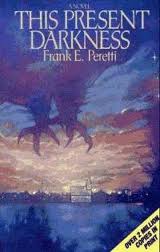
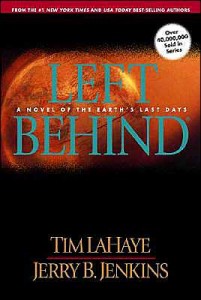
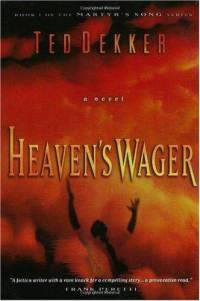



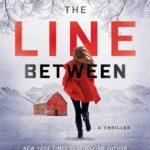

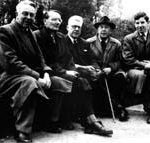



I haven’t read Randy Alcorn at all, but the other four are good. Especially Ted Dekker…I absolutely love his Circle series, but a lot of his other stuff is great too. He does a great job of showing passionate faith
You know, Christians are so willing to swallow Narnia. Nobody ever mentions the strange look my mom got on her face when she was reading Lion the Witch and the Wardrobe for the first time, and we got to the bit where Jadis was Adam’s first wife before Eve and therefore not human. Not being as familiar with mythology as we are now, we didn’t know what to make of that. But Christians don’t squawk about Lewis’s crossover fanfic weirdness anymore. Nope, Aslan = Jesus and that makes Everything All Right.
People really need to read more George MacDonald. His work is so profound as to border on the Really Weird. Like, in Princess and the Goblin, the princess’s Grandmother represents Jesus (Oh noes! a woman representing God! Wait, the Shack did it …) and the magic string on the ring on the princess’s finger represents prayer. And yet it’s still a great story. The sequel, The Princess and Curdie, is also a great story, when Curdie gets the ability to touch a person’s hand and tell if they are human or animal on the inside.
What does this have to do with Churchian dragons? No idea! 🙂
Kessie: I think it strongly relates, because even if the author is not intending to toss the Churchian Dragons “red meat,” they’ll pretend it’s exactly what they want and gobble it up anyway. There’s a fine line between “redeeming” a story that its author wrote in sin (as almost anyone would) by finding the parts that accidentally echo Christ, and salvaging it for spare parts while disrespecting the author’s true intent. The latter practice is what Biblical Christians hate when it’s applied to Scripture — then they go off and do the same “eisegesis” on secular or even Christian-author fantasy because:
And someday they’ll learn what shocked your mother (and others) — that the mythological Lilith gets a nod (falsely, we find out in The Magician’s Nephew) in LWW; and that fantasy “magic” can actually work in “this world” and apparently apart from Aslan; and that Emeth, the “noble pagan,” could “get saved” without knowing it! Without studying the issue thoroughly — without knowing actively how we see other stories in light of God’s epic story, the Gospel — confusion will continue.
Y’know; you do have a point about the Left Behind Series. I never read it because of the associated doctrinal issues (do we really KNOW when or how Jesus will return and everything prophesied in Revelation will turn out), and I didn’t want to get into it everlastingly with someone close to me who is post-trib.
I think if I could have seen past that, I might have been willing to read the books. So in a way, this is the whole Churchian dragon thing working a little backwards.
I loved George MacDonald’s books, and I really liked the Shack. And I do NOT read horror. But I didn’t know when I picked it up what it was. lol
Anyway, for what it’s worth…
Hmm, Krysti, methinks that if you can do fine with The Shack —which I just couldn’t get into, especially before the doctrinally tricky stuff really got started — you would do all right with the Left Behind series, even in a “just for fun” way. (That’s how I read or enjoy its installments now, as a guilty pleasure, the same reason I enjoy The Avengers: Earth’s Mightiest Heroes! animated episodes.)
On truth: despite LB‘s controversial end-times views, the presentation of God’s nature and the Gospel, the most important Biblical truths, are superior to The Shack‘s.
On “beauty”/quality: I would say Left Behind‘s style is superior (by comparison!). Sure, its writer(s) may err on the side of practicality. Yet in this reader’s view, anyway, that is better than forced attempts to get the reader on a character’s side with more-direct attempts at sentimentality and omniscient authorial intrusion, e.g., you gentle reader should feel sympathy with the character at this point now, yes? kinds of statements.
I think there’s certainly an element of perceived safety, what you call “pre-existing solid Christian cred.” If a writer has been vetted in some way by the wider community–a successful pastor, theologian, missionary, or someone who moves in those circles–and is a known quantity, it’s easier to gain acceptance when they strike out into unfamiliar territory.
Thus, C.S. Lewis can employ pagan imagery and metaphors, Peretti can bring spiritual warfare into the physical world, LeHaye & Jenkins can speculate about the apocalypse, and Alcorn can wrestle with social hot-button issues, because people are confident about where these writers are going to lead them. They’re not afraid to dance with the Maenads when they know Aslan is going to sort it all out in the end.
It’s like traveling. You can debark in a new country and take the Gray Line bus around town, or you can follow the guy hanging out by the dock with the cardboard sign that says, “I Do Good Toor – $5 US.” The sign guy may take you to some unforgettable places that you’d never see from the bus, but you also might finish the day in a back-alley with a concussion, minus your wallet. I think people want some assurance that they’re going to have a good experience when they open a book. I know I’ve had times when I’ve finished a story and thought, “Well, that’s x hours of my life I’ll never get back.”
So, the Churchian Dragon is a stereotype to illustrate how Christians form their opinions in discerning good meat from rotten meat in fictional stories? Let’s see if I understand this right:
Pretty much, if your faith beliefs are public knowledge (published in non-fiction or you have a prominent history of involvement in the church) then you have street-credit with the Churchians, and they will gobble up whatever meat you toss them fully trusting that it’s not laced with dragoncide. Such an author can write whatever they want and the Churchains will keep eating it up- but it helps to have some familiar Churchy stories thrown in occasionally to keep building your credit. Usefulness. These authors have it automatically granted to their works, and it gets applied in ways they may or may not have intended.
If you don’t have this credit the Churchians are more cautious of your wares: sniffing for poisons and ripping at it for hidden razorblades, sending it to the CSI Lab for testing, and then blast it with flaming breath to be sure no parasites or diseases are transmitted from it. Some Chruchians may claim such-and-thus comparisons to faith stories that really aren’t there, but gobble them anyway; and others will toss out perfectly good stories because they didn’t get through their rigorous tests that only stories written by people who are not on the All Star Christian list are subjected to. Still digging around for useful application, because enjoyment for enjoyment’s sake alone is a breach of the 11th commandment.
I may be way off, but that’s what I gleaned from this. The moral of the story: if you want your books to be gobbled up without hesitation, first establish a your real-world faith as solid public knowledge. I didn’t get the stealing past the dragons part. Some authors earn a Security-Bypass-Card, and others sit in long lines going through customs.
Hmm, I’d agree with a lot of that, Patrick, though with some clarification about the term Churchian (which “dates,” in this series, to last week’s part 1).
Some Churchians are mostly discerning folks. Real Christians. But they don’t understand how manmade stories could honor God apart from either Harmless Entertainment or else Allegory. They mean well. But they’ve “benefited” from Christians’ frequent silence on the subject. However, they would (mostly) practice truth-discernment in what they read, see, listen to. Yet it takes a writer with solid, popular, “practical” cred to get their attention.
Other Churchians, I suggest, are people who are along for Christianity’s or even their local churches’ rides, but as a means to other ends. I want to keep my family healthy, my marriage decent, practice good ethics. Looks like Jesus is the best way to do that.
Actually, I would agree with that part, not because enjoyment for enjoyment’s sake is a breach of some commandment, but because it’s a circular statement or a reification fallacy. There is no such “person” or entity as enjoyment; therefore it’s impossible to enjoy only for the sake of enjoying. Rather, I suggest enjoyment is either done for God’s glory or done for self’s glory — ultimately there is no “neutral” enjoyment.
Getting a little ahead of next week’s column, I believe this understanding is at the root of how Christians see any kind of story, particularly visionary story: one’s theology of Enjoyment. Lewis had a lot to say about this, using that term, while Scripture has a lot to say about the root word: joy. However, that is contrary to many people’s perception of doing good deeds, or being saved, or even the actions of God Himself, being all done for goal of Doing One’s Duty or Just Because It’s Right — not a Biblical concept.
I’m a very practical guy. I like pragmatism: the shortest distance between two points. So I don’t oppose this kind of Churchian Dragon “practicality” as much as I seriously question what this kind of practicality/pragmatism is trying to get. Does God give His adopted children good gifts primarily to Teach Us Moral Behavior? No. That will follow, but rather, He does all things with the goal of helping us Enjoy Him personally.
Once people understand that, and apply it beyond the usual territories of spiritual disciplines and local-church involvement to the fields of finance, vocation, and even Story and entertainment, I think we’ll have the right kind of “practicality” in place.
Switching metaphors along with you … which ones do you think are awaiting, unfairly, in customs? However, I hope I haven’t hinted that this is the moral of the story: to use or do whatever you can, including forged visas or fence-hopping, to get past the barricade. The above article was mostly intended for illustration and observation: that this happens. However, I do wonder if many authors could work on their nonfiction faith “cred” for their confused Christian readers, and “think incarnationally” to reach out to those folks who can’t help holding their wrongly “practical” assumptions. Some of the authors above have done that, and I think we can at least imitate their example somewhat, while still being who we are and writing exactly how and what we believe God would want us to write.
It’s interesting, some people are very aware of this, and don’t read/let their children read any of the above authors. I’ve run into anti-Lewis people. It’s frustrating.
(I only recently read Dekker, and was rather sorry I hadn’t read it a couple years ago when I was still under the impression that it wasn’t any good from a theology/doctrine standpoint because of some things that some people had said to me which I see were based on incorrect data)
Of course, it is equally frustrating to me to take apart a story to look for allegory. (I’ve heard people do this to Doctor Who, and I’m like… “uh… story? just watch the story! It’s a fun story! We all know that the writers are most probably not Christians so… story! Nice story! Follow the story! Do not add to the story!” <grin>)
So I figure that the best thing to do is ignore the critics and move on because if someone is really into SF, they’re likely to pick up your book anyhow if it looks like quality. 🙂